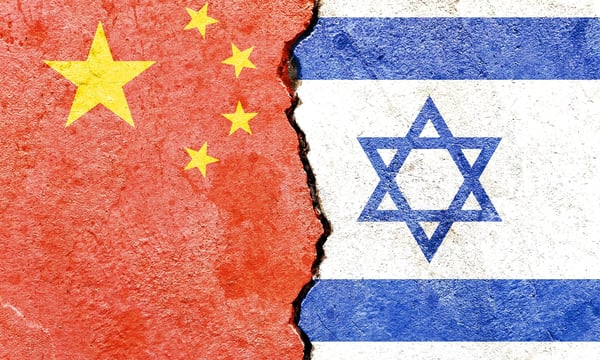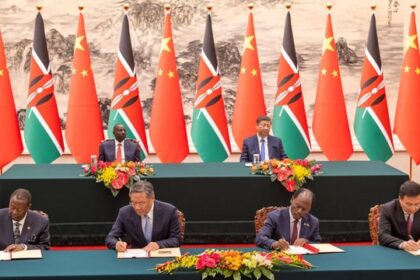Earlier this week, the Chinese Embassy in Israel issued a sharply worded statement condemning what it called “erroneous words and acts” by a member of the Israeli Knesset following a visit to Taiwan. The rebuke was directed at Member of the Knesset (MK) Boaz Toporovsky, a senior member of the centrist Yesh Atid party, and the chairman of the Israel-Taiwan Friendship Group, who headed a parliamentary delegation to Taipei in late April.
In its statement, the embassy accused Toporovsky of “violating the One China principle,” suggested he “take some time to study Chinese history,” and offered to have him visit China and see for himself “that people on both sides of the strait are family bound by blood ties, and that Taiwan belongs to the over 1.4 billion Chinese people, including the 23 million Taiwan compatriots.”
Following a post in X by the Chinese ambassador to Israel, Xiao Junzheng, who repeated the statement, Toporosvsky responded that he would be honored to visit China, but “no one from China found time to talk to me.” He added that he “always remember who stands with Israel and who support[s] our enemies.”
To add insult to injury, Taiwan’s Secretary-General of the National Security Council (and former foreign minister) Joseph Wu trolled Xiao on X, writing: “Hey dude, you talk way too much on @X. Let me sum it up for you: ‘I don’t respect your freedom & sovereignty. I support terrorism & stand with #Israel’s enemies. BTW, the universe belongs to #China.’”
For longtime observers of China-Israel-Taiwan triangular relations, this incident is rather common. Indeed, China has long objected to Israeli parliamentary delegations visiting Taiwan, and similar condemnations have been issued in the past. Already in 2006, during the first parliamentary visit since the establishment of the friendship group, the Chinese ambassador condemned the visit and threatened that “if the event happens again, that matter will be viewed as critical.”
In fact, it is not even the first time that Taiwan’s Wu has something to say in the context of China-Israel relations. In a 2022 interview with Israel’s biggest English-language media outlet, The Jerusalem Post, Wu remarked: “So don’t worry about China getting upset at you. When they get upset at you, that means you are doing something right.”
What makes the latest incident puzzling, however, is the timing. Toporovsky’s visit to Taiwan occurred in April, yet Beijing’s reaction came only now in July. Even more striking is that this rhetoric came on the heels of what appeared to be a Chinese charm offensive in Israel. Since the appointment of Xiao Junzheng as ambassador in late 2024, it seems that the Chinese Foreign Ministry and Xiao have taken some steps to improve Beijing’s image in Israel. These include softer public messaging over the Gaza war, increased outreach to Israeli think tanks and journalists, and a more balanced approach to the Palestinian conflict, as well as the Israel-Iran war, in Chinese state media. The goal seemed to be to stabilize ties after a period of deterioration that had begun even before the October 7 Hamas attack, arguably dating back to Trump’s first term and his administration’s efforts to pressure Israel to reduce Chinese access to sensitive technologies and infrastructure.
This makes the delayed condemnation appear out of step with Beijing’s recent approach. If China is trying to build goodwill, why would it publicly revive an issue from over two months ago?
Several explanations may help make sense of this sudden diplomatic shift.
First, Beijing may be sending a calibrated warning to Israel not to deepen its ties with Taiwan, even symbolically. Toporovsky himself praised Taiwan’s democracy, spoke of the importance of strengthening bilateral ties, and in a recent tweet expressed concern over reports about Chinese surveillance on Taiwan’s then-vice president-elect Hsiao Bi-khim during her trip to Prague. The embassy’s message served to reiterate that this type of engagement will not go unnoticed.
At the same time, the statement targeted Taipei as well. As President Lai Ching-te seeks to expand Taiwan’s international space, China is actively working to limit it. Condemning Israeli MKs acts as a signal to other countries: even informal parliamentary exchanges will draw pushback.
Second, the timing may be tied to China’s strategic deepening of ties with Iran. Recently, media reports have surfaced indicating that Beijing may supply Tehran with HQ-9B air defense systems and J-10C fighter jets, two advanced systems that could significantly improve Iran’s military capabilities. If these transfers proceed, they would mark a notable escalation in China’s role in regional military affairs and a direct challenge to Israeli (as well as U.S.) security interests. By reviving the Taiwan issue, Beijing may be seeking to preempt Israeli criticism or shift the diplomatic narrative, portraying Israel as the actor causing friction. In this view, the Taiwan condemnation becomes a form of strategic hedging: asserting pressure on one front while deflecting attention from another.
Third, the statement could also reflect growing Chinese frustration over Israel’s shifting China policy. Israel has come under increasing U.S. pressure to reduce its economic and technological exposure to China. This includes growing scrutiny over Chinese investments, especially in critical infrastructure, and more recently, over the supply and use of Chinese electric vehicles (EVs) in the Israeli market and within the Israeli Defense Forces. Indeed, Israeli policymakers have begun signaling a shift, driven in part by national security considerations and closer alignment with U.S. regulatory trends. From Beijing’s perspective, this could be seen as part of a broader pattern of Israeli drift toward the U.S.-led containment posture. The embassy’s statement, then, may serve as a proxy for expressing broader dissatisfaction with the trajectory of the bilateral relationship.
A fourth possibility related to Israel’s expanding ties with India and its potential participation in the India-Middle East-Europe Economic Corridor (IMEC), a U.S-backed infrastructure initiative. IMEC aims to link India to Europe via the United Arab Emirates, Saudi Arabia, Jordan, and Israel, creating a strategic land-and-sea route that rivals China’s Belt and Road Initiative (BRI). China is deeply wary of IMEC, which it sees as part of a broader Western effort to dilute its influence across Eurasia. Israel’s role in this corridor, alongside its growing interest in strengthening ties with India, could be viewed in Beijing as further evidence of Israel distancing itself from Chinese strategic frameworks. The Taiwan rebuke may thus reflect a broader geoeconomic concern: that Israel is helping build the very alternatives that China seeks to blunt.
Yet, notwithstanding all the aforementioned possibilities, perhaps we are overcomplicating things. Maybe there is no deep geopolitical rationale behind Beijing’s recent move, no clear linkage to Iran, India, or economic pressure. Perhaps the statement was simply the result of bureaucratic inertia, or a routine effort to enforce the One China principle without much strategic thought. Maybe, there is nothing behind it at all.
And that, in itself, is telling.
Beijing is juggling a fragile diplomatic posture in the Middle East: courting Iran militarily, losing influence in Israel, competing with India, and watching the United States regain its foothold in the region.
For years, Chinese foreign policy was portrayed as calculated and pragmatic, a reliable contrast to the erratic turns of U.S. diplomacy under President Donald Trump. One could argue that Trump simply does what is good for him at any given moment, guided more by instinct and domestic political calculus than strategic consistency. By contrast, Beijing cultivated an image of being deliberate, long-term in outlook, and strategically composed. Yet episodes like this one suggest something else: not pragmatism, but indecision.
As the Middle East slides back into open conflict, U.S. regional dominance reasserts itself, and economic incentives lose their leverage, China appears increasingly unsure of how to position itself. Symbolic rebukes, charm offensives, and military hedging may buy time, but they do not add up to a coherent regional strategy. In this context, deciphering Beijing’s intentions has become more difficult than ever – not because its strategy is subtle or sophisticated, but because it increasingly lacks the consistency and clarity it once projected.






